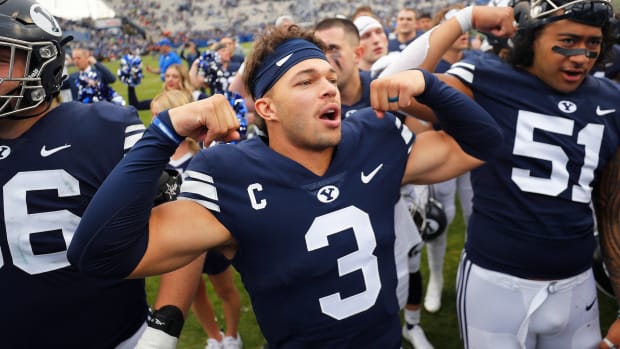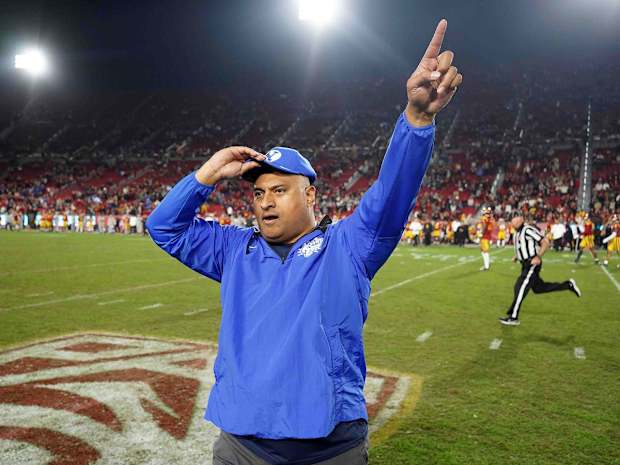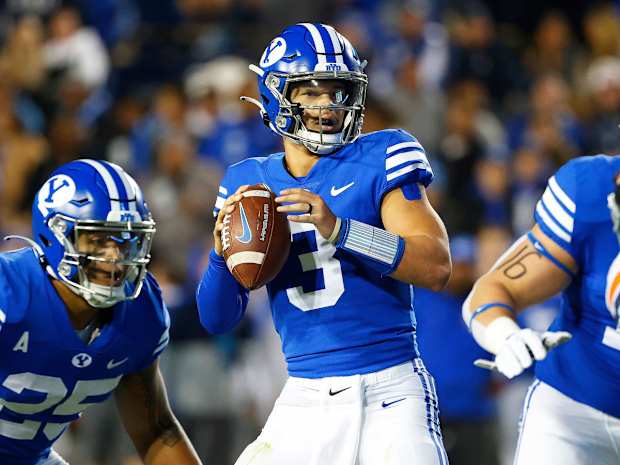The most significant day in BYU’s 99-year football history was greeted with relative quiet within the program itself.
“It was right before we played Utah,” junior wide receiver Puka Nacua recalls. “That’s obviously a huge game for us, as our in-state rival. It was kind of downplayed in our facility because of how important that game was and how focused we were for that game.”
Nacua is referring to the September 2021 announcement that the Cougars will play football in the Big 12 Conference, beginning with the ’23 season. The move will end 12 years of independence for one of college football’s most consistent winners outside the Power 5. More importantly, it will give the most recent program from outside a major conference to win the national title automatic access to a true championship framework for the first time.

Jeffrey Swinger/USA TODAY Sports
Like the other three teams joining the league in the near future—UCF, Cincinnati and Houston—the Cougars don’t quite fit the Group of 5 mold. BYU drew an average of 61,647 fans per game to LaVell Edwards Stadium in 2021 and has its own TV deal with ESPN.
“We travel really well. Whenever we play in different parts of the country, our fans will show up and cheer and cheer their hearts out,” coach Kalani Sitake says. “One thing we know we can count on is a fanbase that is strong and proud of our program in our athletic department. Now that we’re in [the Big 12], it seems like we’ve got to catch up to our fan base and the expectations they have of us.”
In the last two seasons in particular, the wins have come in bunches for BYU. The Cougars won 11 games and the Boca Raton Bowl in 2020, amassing their highest single-season winning percentage since 1996, in a pandemic-shortened season. They followed that up with a 10–3 campaign in ’21 against a much more difficult schedule.
Notably, BYU swept all five Pac-12 opponents it played in 2021: Arizona, the Utes, Arizona State, Washington State and USC.
“It’s a great step in the right direction,” junior quarterback Jaren Hall says. “Being independent, it’s hard to fill your schedule with that many opportunities. And that’s nobody’s fault, right? Everyone’s schedule is tough. So that’s why the conference could be great for us.”
What’s past is prologue as the Cougars stare down another perilous slate in 2022. Baylor—a future conference foe—visits Provo, as does Arkansas. Road dates with Oregon and Stanford loom, and that’s to say nothing of the headliner—a date with Marcus Freeman and Notre Dame in Las Vegas, already slated for national TV on Oct. 8.
BYU, though, has the tools to meet this unique historical moment. It starts and ends with what many teams in 2022 lack: stability at head coach and the quarterback position. Sitake is entering Year 7 in Provo. Hall saw his first game action for the Cougars on Nov. 3, 2018.
Both men have deep roots in the Beehive State. Long before Sitake took the reins at BYU, he was a three-year starter at fullback under LaVell Edwards from 1997 to 2000. He absorbed lessons from Edwards and other mentors that stuck with him as he rose through the coaching ranks, from a 10-year stint as a Utah assistant to a year at Oregon State as a defensive coordinator. Finally, in 2015, he was named the coach of his alma mater after Bronco Mendenhall decamped for Virginia—and a familiar face was around to offer guidance.
“We’re just talking about a head coach [in Edwards] who was well-liked by his peers and respected,” Sitake says. “I was lucky to be the head coach here where my first year here was his last year on Earth. I enjoyed the ability to meet with him every week [before his death in December 2016].”
After a successful first season in 2016, culminating in a victory over Wyoming in the final Poinsettia Bowl, Sitake’s Cougars struggled to find a foothold. BYU slumped to 4–9 in ’17, losing its home finale to Massachusetts. Back-to-back 7–6 seasons followed, featuring a mixed bag of highs (a shocking upset of then No. 6 Wisconsin in ’18) and lows (a 7–6 loss to Northern Illinois a month later).
Sitake, a father of three, compares the experience of those choppy early years to being a parent for the first time. “I studied as much as I could, on how to take care of kids and how to clean and all that stuff,” the coach says. “And then you just kind of learn by experience. You kind of figure things out along the way.”

Kirby Lee/USA TODAY Network
As Sitake figured things out, so too did the Cougars. They lost just once in 2020, in a hastily arranged trip to Conway, S.C., to meet Coastal Carolina. Over two successful years, BYU was enveloped by its coach’s energy and enthusiasm.
“You would think he’d had 20 pre-workout shots of Monster energy, that this guy was just living off Monster energy drinks all day,” says Nacua, who transferred from Washington after the 2020 season, of his first impressions of Sitake. “He’s always smiling. He’s always having a good time. He’s definitely a player’s coach.”
The Cougars’ signpost wins in the last two years aren’t hard to identify: a 51–17 shellacking of Boise State in 2020, a blowout win over UCF in that season’s Boca Raton Bowl, and every Pac-12 win in ’21. BYU’s 26–17 win over Utah in the wake of the big conference announcement, its first in the Holy War since ’09, especially stands out. Sitake, however, downplays the notion of a particular breakthrough moment.
“This has always been a gradual climb. There’s gonna be some moments where you take one step forward, two steps back,” he says. “As long as you’re trying to go and have success, you’re gonna have some failures along the way.”
Few in the Cougars’ program outside the coaching staff have viewed BYU’s successes and failures over a longer timescale than Hall. The quarterback, who played his high school ball in Spanish Fork 20 minutes south of Provo, committed to the Cougars way back in 2014. He finished his career at Maple Mountain High School with 5,109 passing yards and 52 touchdowns before heading up I-15 to BYU.
He waited his turn in the Cougars’ quarterback room, biding his time behind entrenched starter Zach Wilson. Hall redshirted in 2018 and made two spot starts in 2019, during which Wilson battled injuries. In ’20, Hall took a medical redshirt as Wilson rocketed to an eighth-place finish in the Heisman voting; he cited “the way [Wilson] prepared every week” as a key takeaway from watching the future New York Jets gunslinger in a pandemic-affected season.
“That year, with COVID-19 and all the uncertainty, I felt like our team was always the most prepared,” Hall says. “It’s a reminder that now that we’re out of the pandemic in terms of it affecting scheduling and whatnot, even knowing who you’re gonna play Saturday, now you still have to make sure you’re the most prepared.”
Nacua, one of Hall’s favorite targets in 2021, sees the quarterback’s leadership style as different from Sitake’s—reserved, but effective all the same in a way that “made it really easy to fall in love with the way he was going to play the game.”
“It’s almost the exact opposite [from Sitake’s],” he says. “[Jaren’s] a young dad and living the college life right now, and he’s been super mature. Like the perfect kind of quarterback.”
Hall stepped in as a capable replacement for Wilson from the jump, throwing a pair of touchdowns against Arizona in the season opener. The following week, in the Holy War, he played perhaps his most complete game in a BYU uniform. Hall tossed three touchdowns and kept Utah’s defense on its toes with 92 rushing yards, averaging 11.5 yards per carry. He finished the year with 20 touchdowns in 10 games, against just five interceptions.

Jeffrey Swinger/USA TODAY Sports
The natural next step would be for Hall to join the pantheon of BYU quarterbacks—a lineage that extends from the ‘70s, when Gary Sheide and Gifford Nielsen were carving up the WAC, through the present day. To that end, Hall has worked to sharpen his processing this offseason —an improvement of which Sitake has taken notice.
“It’s just a matter of seeing everything on the field before it happens,” Hall says. “The best way to succeed at the quarterback position is to know what’s going on better than everybody else.”
“Just being able to calculate, and put the ball where it needs to go—he and offensive coordinator [Aaron Roderick] are almost able to finish each other’s sentences,” Sitake says. “He’s becoming another coach on the field. In the past, he had to learn his role at quarterback. Now he knows what everyone else is having to do on the field.”
With back-to-back 10-win seasons under their belts, the new goal for the Cougars seems obvious: an unbeaten season and a run at the College Football Playoff, following the trail blazed by Cincinnati in 2021. BYU hasn’t sniffed the AP top 5 since beating Kansas State in the Cotton Bowl in January 1997, and no non-Notre Dame independent has reached the top 5 in the last 30 seasons.
“We just have to [focus] on USF, and going to their place [to start the season],” Hall says, not wanting a squad returning more production than any team in the FBS except Bowling Green to look too far ahead. “If we win there, the sky’s the limit.”
Closely monitoring the progress of Sitake’s program in 2022 as it prepares to join the Big Big 12 are members of the 1984 Cougars—the team that set the standard for mid-major claimants to national glory.
“Once we got into the Big 12, I just thought, ‘We finally made it. We’re finally getting that recognition,’” says former quarterback Robbie Bosco, who provided the steady hand for that national championship team and finished third in the Heisman voting. “Everybody was super pumped. Not only current players, but former players and coaches.”
The schedule may be tougher for BYU in 2022, but the focus on the quarterback position remains the same—and Bosco believes Hall is up to the task.
“He’s done a tremendous job at starting quarterback. He’s won a lot of football games,” Bosco says. “When football teams are winning a lot of football games, that’s usually when a quarterback is playing pretty good football.”
Former players’ acclaim for Sitake takes on a similar tone. “Kalani does a heck of a job,” defensive end Jim Herrmann, who was All-WAC in 1984, says. “Just getting BYU going in the right direction, turning the program into something that’s recognized nationally … alumni were stoked to have him back in the fold, and they’re certainly ecstatic at what he’s accomplished.”
The weight of the past looms large in Provo, as does the weight of the future. Conference games against New Mexico, UTEP and Colorado State are history, with conference games against Oklahoma State, Kansas State and West Virginia to come.
Before 2023, though, the Cougars have 12 games to play this fall—some easy, some difficult, but all bound to be colored by Hall’s experience and Sitake’s excitement.
“I want them to stay humble and hungry and not worry about anything other than trying their best,” Sitake says. “If they come out and try their best, then we can live with the results.”







